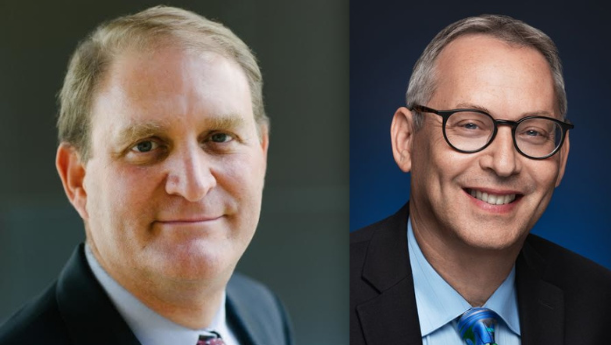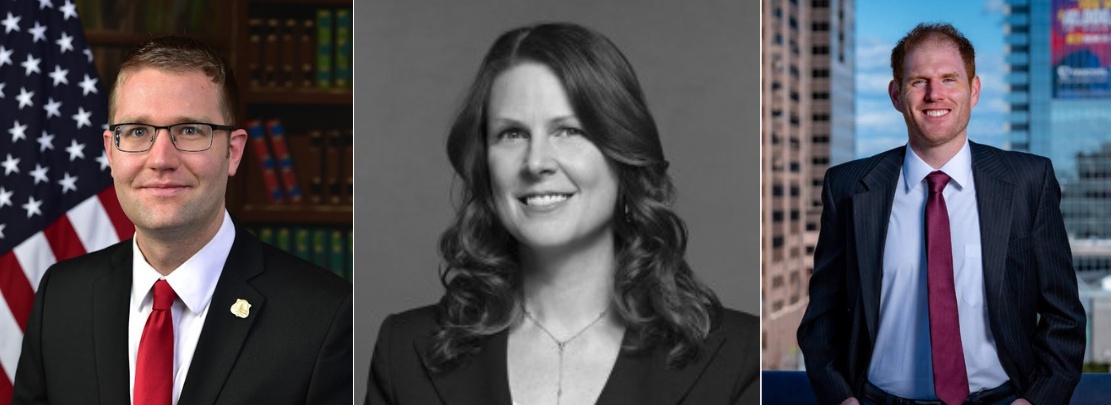Category Archives: election subversion risk
“Donald Trump’s Plan to Subvert the Midterms is Already Underway”
David Graham cover story in The Atlantic.
Video: “The Ultimate Check: How Free and Fair are Our Elections?”
Society for the Rule of Law panel:
In theory, elections are the greatest safeguard of democracy—but in practice, their integrity is under increasing pressure. This panel assessed the resilience of our electoral systems amid rising challenges—from partisan interference and election denialism to foreign influence and the rise of disinformation and AI-generated distortion. Panelists explored recent and threatened actions by the Trump Administration and the Federal Election Commission. They also spotlighted credible reforms—and the institutional strengths—that can preserve electoral legitimacy and reinforce the rule of law. Featured speakers:
• Stephen Richer, Former Maricopa County Recorder
• Trevor Potter, Campaign Legal Center
• Matt Germer, R Street Institute
• Richard Bernstein, Society for the Rule of Law
I Spoke with MSNBC’s Jen Psaki About How Worried People Should Be About DOJ Observers to CA and NJ Elections and Steve Bannon’s Threats of a 3rd Trump Term
Watch Archived Video of Nate Persily’s Must-Watch Presentation for the Safeguarding Democracy Project on Lessons for 2024 and Risks to the 2026 Midterm Elections
Nate packs a lot of data and important observations into this talk, which was held on October 7, 2025. Watch:
Must-Watch Safeguarding Democracy Project Webinar Today: Nate Persily on Lessons from 2024 on the Risks to the 2026 Elections
You can register to watch here. Nate will be in person at UCLA and I’ll be moderating the event with a live audience.
“Abcarian: Does Donald Trump really think he can run for president again in 2028?”
Robin Abcarian in the LA Times:
At this point, the Constitution seems less a constraint than a mere sticking point for Trump as he smashmouths his way past anything that impedes his heart’s desires.
“I think the scenario in which he can legitimately — through some even remotely quasi-democratic means — stay on after January of 2029 is zero,” said [Pamela] Karlan, who co-directs Stanford’s Supreme Court Litigation Clinic, and served twice as a deputy assistant attorney general in the Justice Department’s Civil Rights Division.
What about a scenario, though, where Trump could be, say, JD Vance’s running mate in 2028 and then return to power once Vance steps aside?
“Some people make cutesy arguments…that he should run as vice president, but I think most states would refuse to put him on the ballot,” Karlan said. “It’s an argument made by people who are cleverer than they are smart.”
On the other hand, she noted, if a pro-Trump Republican candidate were to win in 2028, Trump could function as something of a shadow president.
“He could be the power behind the president in the sense that the president could name him secretary of State,” Karlan said. “Or theoretically attorney general, even though he’s not a lawyer, or name him secretary of whatever they are calling the Defense Department at that point.”
Election law expert Rick Hasen, director of the Safeguarding Democracy Project at the UCLA School of Law, told me he’s less worried about the next presidential election and far more concerned about ways in which Trump might interfere in the 2026 midterms.
“I think 2028 is a long way off and assuming that Trump does not try to run again, he may not have that much interest in the next election because he will be done,” Hasen said. “Also, he is 79.”
In 2026, though, Trump could wreak all kinds of electoral havoc, Hasen said, such as “Sending troops to block voting in some areas, seizing voting machines, pressuring election officials to illegally count or not count valid ballots, or change the vote count — the kinds of things we saw in the aftermath of the 2020 election. I don’t think anything is off the table.”…
“Exclusive: Nevada’s acting US Attorney urged voter fraud probe to help Republicans, document shows”
Nevada’s top federal prosecutor has asked the FBI to investigate debunked Republican claims about voter fraud in the 2020 election, a probe she hopes will influence congressional races and ensnare Democrats, according to a government document seen by Reuters.
In late July, U.S. Attorney Sigal Chattah told Justice Department officials she met with federal agents and handed them a thumb drive containing data compiled by Nevada’s Republican Party about people living in the U.S. illegally who cast ballots in the 2020 election and members of Indian tribes who allegedly received cash for ballots, the document shows. She also urged the agents to call the state’s Republican Party attorney.
Chattah said she expects to pursue a variety of investigative lines of inquiry, but legal experts said she has multiple conflicts of interest and should recuse herself from any investigations involving certain legal clients or political matters she was involved with directly. Justice Department guidelines also stipulate that prosecutors cannot initiate a case based on “political association, activities, or beliefs.”
Chattah told senior officials she wants to remove “illegal aliens” from voter rolls which would possibly lead to a “reallocation of census numbers” and affect the race for Nevada’s 4th congressional district seat, currently held by Democratic U.S. Representative Steven Horsford, the document shows.
Chattah said she also wants to exonerate the six Republicans who were prosecuted by Nevada Attorney General Aaron Ford for posing as fake electors in a failed bid to keep President Donald Trump in power after he lost the 2020 election to Democrat Joe Biden.
Chattah defended one of the accused and a lower court dismissed the charges. The state appealed the case, which is still pending.
Update: Judge Disqualifies Nevada’s Acting U.S. Attorney From Handling Cases
Safeguarding Democracy Project Live and Online Program October 7: “Lessons from the 2024 Elections for 2026 and Beyond: A Conversation with Nate Persily”

Tuesday, October 7, 12:15pm-1:15pm PT, Room 1337
UCLA Law and online
Register here for in-person. Lunch will be provided.
Register here for Webinar.
Richard L. Hasen, Director, Safeguarding Democracy Project, UCLA and Nate Persily, Stanford Law School
UCLA School of Law is a State Bar of California approved MCLE provider. This session is approved for 1 hour of MCLE credit.
ELB Podcast 7:1: The Risk of Federal Interference in the 2026 Midterm Elections (Haiman, Howard, Richer)
Season 7, Episode 1 of The ELB podcast:

How likely is it that federal troops will be in United States cities on election day in 2026?
Have federal agencies moved from allies of state and local election administrators to impediments to sound election practices?
What changes might we expect regarding voter rolls and mail-in voting in 2026
On Season 7, Episode 1 of the ELB Podcast, we speak with Ben Haiman, Liz Howard, and Stephen Richer.
You can subscribe on Soundcloud, Apple Podcasts, and Spotify.
Watch Archived Video of Safeguarding Democracy Project Program, “The Risk of Federal Interference in the 2026 Midterm Elections”
Today: Free Webinar from Safeguarding Democracy Project: “The Risk of Federal Interference in the 2026 Midterm Elections”

Tuesday, September 16, 12:15pm-1:15pm PT, Webinar
Register here.
Ben Haiman, UVA Center for Public Safety and Justice, Liz Howard, NYU Law Brennan Center for Justice, and Stephen Richer, Ash Center for Democratic Governance and Innovation, Harvard Kennedy School
Richard L. Hasen, moderator (Director, Safeguarding Democracy Project, UCLA)
UCLA School of Law is a State Bar of California approved MCLE provider. This session is approved for 1 hour of MCLE credit.
“Brazil’s Former President Was Convicted of Plotting a Coup. What Comes Next?; Jair Bolsonaro was sentenced to 27 years in prison for conspiring to cling to power after losing the 2022 elections.”
NYT:
Brazil’s former president, Jair Bolsonaro, was sentenced to more than 27 years in prison on Thursday for overseeing a failed coup plot after losing the 2022 elections, a landmark ruling for Latin America’s largest nation.
Mr. Bolsonaro was convicted of orchestrating a vast conspiracy that included overturning the vote, dismantling courts, handing special powers to the military and assassinating the president-elect, Luiz Inácio Lula da Silva, who won the election.
Mr. Bolsonaro denied plotting a coup or planning to kill his political rival. He accused the Supreme Court justice who oversaw his trial, Justice Alexandre de Moraes, of unfairly targeting him and his right-wing movement.
The ruling marks the first time that Brazil, a nation with a long history of coups, has held accountable a leader who tried to subvert its democracy. But it is far from clear whether Mr. Bolsonaro will actually end up behind bars.
His conviction could also worsen the diplomatic tension between Brazil and the United States, which escalated after President Trump’s tried to help Mr. Bolsonaro, an ally, by applying tariffs and sanctions on Brazil….